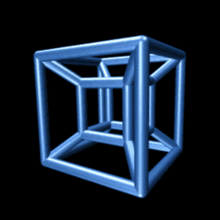Ten-dimensional space
In mathematics, a sequence of n real numbers can be understood as a location in n-dimensional space. When n = 10, the set of all such locations is called 10-dimensional space. Often such spaces are studied as vector spaces, without any notion of distance. Ten-dimensional Euclidean space is ten-dimensional space equipped with a Euclidean metric, which is defined by the dot product.[Dubious – discuss]
More generally the term may refer to a ten-dimensional vector space over any field, such as an ten-dimensional complex vector space, which has 20 real dimensions. It may also refer to an Ten-dimensional manifold such as an 10-sphere, or a variety of other geometric constructions.
Geometry
10-polytope
A polytope in ten dimensions is called a 10-polytope. The most studied are the regular polytopes, of which there are only three in ten dimensions: the 10-simplex, 10-cube, and 10-orthoplex. A wider family are the uniform 10-polytopes, constructed from fundamental symmetry domains of reflection, each domain defined by a Coxeter group. Each uniform polytope is defined by a ringed Coxeter-Dynkin diagram. The 10-demicube is a unique polytope from the D10 family.
| A10 | B10 | D10 | |||||||||
|---|---|---|---|---|---|---|---|---|---|---|---|
 10-simplex |
 10-cube |
 10-orthoplex |
 10-demicube | ||||||||
References
- H.S.M. Coxeter:
- H.S.M. Coxeter, Regular Polytopes, 3rd Edition, Dover New York, 1973
- Kaleidoscopes: Selected Writings of H.S.M. Coxeter, edited by F. Arthur Sherk, Peter McMullen, Anthony C. Thompson, Asia Ivic Weiss, Wiley-Interscience Publication, 1995, ISBN 978-0-471-01003-6 Wiley::Kaleidoscopes: Selected Writings of H.S.M. Coxeter
- (Paper 22) H.S.M. Coxeter, Regular and Semi Regular Polytopes I, [Math. Zeit. 46 (1940) 380-407, MR 2,10]
- (Paper 23) H.S.M. Coxeter, Regular and Semi-Regular Polytopes II, [Math. Zeit. 188 (1985) 559-591]
- (Paper 24) H.S.M. Coxeter, Regular and Semi-Regular Polytopes III, [Math. Zeit. 200 (1988) 3-45]
- Table of the Highest Kissing Numbers Presently Known maintained by Gabriele Nebe and Neil Sloane (lower bounds)
- . (Review).
- (Second printing)
